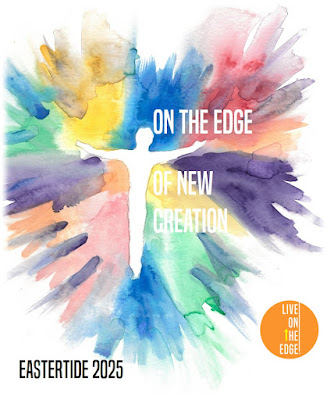Community, Not Commodity--May 1, 2025
"To him who loves us and freed us from our sins by his blood, and made us to be a kingdom, priests serving his God and Father, to him be glory and dominion forever and ever. Amen. Look! He is coming with the clouds; every eye will see him, even those who pierced him; and on his account all the tribes of the earth will wail. So it is to be. Amen." (Revelation 1:5b-7)
What we have from God through Jesus is not merely a product called "salvation" or a commodity called "eternal life." No, what we have is a new identity--a new kind of belonging in a new kind of community--that makes us stand out in the midst of the world's tired old rat race. We are not just cogs in a machine or contributors to the Gross Domestic Product. We are not perpetual competitors in a never-ending game of King of the Hill (or its modern-day streaming-service equivalents, the Hunger Games or Squid Game), doomed to fight and claw at each other forever. We are a holy people. We are a kingdom of priests.
At least, that's the way the writer of Revelation describes us, the community of Jesus' disciples, in this passage that many of us heard this past Sunday in worship. We are "a kingdom, priests serving God." And, of course, John of Patmos (the writer of Revelation) didn't invent that idea himself--he's just borrowing it from the Torah, when the nation of freed slaves had been brought through the Sea and God declared to them at the foot of Mount Sinai, "You shall be for me a priestly kingdom and a holy nation" (Exodus 19:6). The book of Revelation borrows that same way of thinking to talk about the community of Jesus' followers, too. We are meant to stand out in the world--which is really what "holiness" is all about--and to present an alternative way of being in the world that runs counter to the dominant way (the rat race, the you-are-just-your-possessions mindset, the cog-in-the-machine way of living). And even that holiness, that unique way that we stick out in the world, is a gift of God's creation in us.
That was true for the freed Israelites, too. God called them "a holy nation," not because they already had a track record for moral purity or rigorous virtue, but simply as God's creative power can make us into something new, like speaking light out of darkness in the beginning. God calls the Israelites to be a holy people, a "kingdom of priests," not in the sense of putting on airs of religiosity or acting "holier-than-thou," but in the sense that they were meant to embody God's own character of justice and mercy. As a people, their practice of compassion for those who suffer, of provision for vulnerable people like "the widow, the orphan, and the foreigner," and of loving God over material wealth was supposed to set them apart. The recurring theme of the Hebrew Scriptures is that the surrounding nations are supposed to see the unique ways that the Israelites live and to be compelled to want to be a part of it. The surrounding nations will all stream to Jerusalem and want to learn the ways of God's people, and to share in their covenant of justice and mercy. That's what it is supposed to mean to be a holy nation and a priestly kingdom--not just that perform a lot of religious rituals or put on shows of piety. It's not about declaring a national religion--it's about living together, as a community of God's people, according to the peculiar character of that God.
And even though the ancient Israelites often did a pretty poor job of living up to that calling (like we still do), the vision is still compelling, and that vocation is still there for us as Jesus' followers. We are called to stand out in the world, not by our faith-themed accessories or bumper stickers, but by leading lives that reflect the character of the God we know in Jesus. We will stand out against the powers of our day like the first-century Christians were called to stand out in contrast to the crookedness and brutality of the Roman Empire. We will be different because we won't just be interested in getting more money or more power, and we won't just be chasing after the newest, the latest, or the flashiest of the "next big thing." We will be willing to love more than just our own little group--you know, to be unusual the way Jesus is unusual. We will refuse to return evil for evil, the same way Jesus does not answer violence and hatred with more of the same. And we will not dedicate our lives to the alluring idols of our day (whether the pull of more money, the lure of social media popularity, or the persuasion of demagogues), but rather to the way Jesus. That's what it looks like for us to be a holy people. That's what it means to be a "kingdom of priests."
What are the ways you and I might be called to stand out from the crowd today? What might we walk away from--and what might we run closer to? What will make us seem unusual in the eyes of coworkers, neighbors, and strangers who take a look at our lives and wonder about us?
That's the question to ask ourselves. How will other people see the difference it makes that God has called us and made us to be a countercultural community... a holy people... a kingdom that reflects God's character?
Lord Jesus, let us stand out as your people in the midst of a world tired of the same old games.












